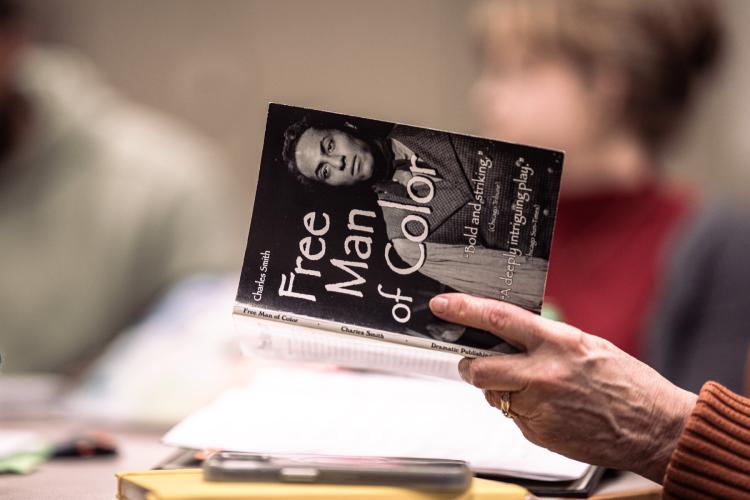
OHIO Distinguished Professor of Playwriting Charles Smith’s “Free Man of Color” to be produced at Templeton-Blackburn Memorial Auditorium on Feb. 10

Taking place in the building that inspired the story, “Free Man of Color” will return to Ohio University on Saturday, Feb. 10, at 3 p.m. for a reading 20 years after the play’s initial development and performance at the University.
“This year's theme for Black History Month is African Americans in the arts, so it just seemed like a perfect time for bringing this play in,” OHIO Assistant Director for Experiential Design Courtney Kessel who is also on the University’s Black History Month committee said.
Distinguished Professor of Playwriting Emeritus Charles Smith wrote “Free Man of Color” in 2004, a few years after his arrival at OHIO. Smith initially read about the history of Templeton-Blackburn Memorial Auditorium, which was named after the first black male and female students to attend the University, and was surprised at how little people understood the importance of the name of the auditorium.

“I thought, if I ever got the chance, I would try to humbly do something about that,” Smith said.
Around the same time, former Ohio University President Robert Glidden commissioned Smith to write a play to commemorate the University’s bicentennial anniversary in 2004.
“At first I was like, ‘you know I’m not that type of writer, I don’t want to do a pageant... I want it to be an honest play,’” Smith said.
Although hesitant, after researching more about the University, he eventually wrote a play chronicling John Newton Templeton’s story. He went on to develop the play in Chicago, utilizing connections in the Chicago theater industry developed throughout his professional career to assist bringing the story of Templeton to the stage.
According to Emerita Professor of Theater Shelly Delaney, the play initially ran at the Victory Gardens Theater with a Chicago-based director and actors. Delaney originally played the role of Jane, the wife of President Robert Wilson, and has the unique opportunity of returning to her experience with the script two decades later as the director for the upcoming reading.
“My attachment to the play is both because I was at the birth of it, and also because as an actor it remains one of the single most challenging and rewarding things I have ever done. It was as costly and exhilarating as anything I have ever done,” Delaney said.

Besides its tie to Black History Month, the show is also timely because 2024 marks the 200th anniversary of black students being on campus. Smith believes the play will be received similarly now as it was in 2004. His assertion is supported by the similarities drawn from the play over many years to current events.
For example, the play has been performed across the globe, including in Australia, where Smith said he was asked how he came up with the idea to write a play about American slavery as a metaphor for Australia’s relationship with aboriginal people. Another correlation was seen during the Democratic primaries in 2008, where Smith was asked about the intersection of the play’s abolitionist and feminist themes as a metaphor for the relationship between Barack Obama and Hillary Clinton.
“The play apparently has some universal and everlasting truths about colonization, about a white-male dominance that ends up crushing everything,” he added.
Smith recalls a positive reception from the press in Chicago, despite the residents of the city not knowing much about Ohio, let alone Ohio University. Delaney also recalls a successful run in Chicago, specifically within the alumni audience members who traveled to see the production.
Unlike the original run of “Free Man of Color,” the upcoming rendition is a reading, rather than a full-blown production. While Delaney recognizes the audience’s desire to witness a heavily-produced performance, she believes “when the play is this good, nobody cares.”
“We will have put 30 hours in a rehearsal room breaking it apart, so these actors are excited to be working on it and will know what they’re doing. I promise people will forget they have a script in hand,” Delaney said.

While the director is often tempted to take the performance to the next level, she recognizes the power of the script when it isn’t cluttered by other aspects of performance, allowing the actors to preserve the clarity and depth of the writing.
“I read the whole play and I don’t feel like it needs anything else,” Kessel added. “It’s so much about the dialogue and the…intensity of those three people and the conversations about what’s happening at that time, my imagination is lit up.”
To enhance the message of the play, Smith will be participating in a talkback after the reading, joined by Delaney and some of the actors. The dialogue will be moderated by OHIO Associate Professor of Theater History Dr. Matthew Cornish.
“I really hope the audience learns the history of where they live and where they go to school, for students and community members. I hope that it also sheds light on a white-washed history, how much isn’t told or known from the blurbs,” Kessel said.
Kessel and Delaney both believe the work Smith put into understanding the history and research behind his play makes it a special piece of work that everybody would benefit from seeing.
“Charles is invested deeply in what these plays have to say, and any opportunity to be in a context where what he wants to say through these plays…and characters can be shared in a way that elicits dialogue and questions and provocations, he’s in,” Delaney said.
Smith hopes to help the reading in any way he can, but doesn’t intend to be a “playwright police.”
“They have the freedom to do what they please with the play…however they want to do it, they can do it,” he said.
